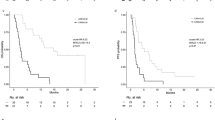Abstract
The aim of this study was to investigate the effect of C-reactive protein (CRP) level on the prognosis of patients with locoregionally advanced laryngeal carcinoma treated with chemoradiotherapy. Fifty-seven patients with locoregionally advanced laryngeal carcinoma (cT3–4, N0–3, M0) treated with chemoradiotherapy were reviewed retrospectively. Chemoradiotherapy comprised external beam radiotherapy to the larynx (70 Gy) with three cycles of cisplatin at 3-week intervals. Elevated CRP was defined as >8 mg/L. The survival rate was calculated using the Kaplan–Meier method, and a multivariate analysis was used to identify significant factors associated with prognosis, using a Cox proportional hazards model. During the median (range) follow-up of 5 years (1.3–5), 29 patients died from laryngeal cancer; the 5-year cancer-specific survival (CSS) rate was 49.12%. Fifteen patients had a high CRP level before chemoradiotherapy (>8 mg/L), and their CSS rate was significantly worse than that in the remaining patients (P = 0.003). Multivariate analysis showed that CRP and tumor site were independent prognostic indicators for CSS, with a hazard ratio of 2.66 (95% confidence interval (CI), 1.22–5.82; P = 0.014) and a hazard ratio of 1.67 (95% CI, 1.01–2.77; P = 0.045), respectively. Of those with elevated CRP, the CRP levels of ten patients became normal after chemoradiotherapy, of whom four were alive with no evidence of recurrence or metastasis during the follow-up. By contrast, all six with no CRP normalization after chemoradiotherapy died within 3.8 years. The elevation of CRP before treatment predicts a poor prognosis in patients with locoregionally advanced laryngeal carcinoma treated with chemoradiotherapy.


Similar content being viewed by others
References
Mantz CA, Vokes EE, Kies MS, Mittal B, Witt ME, List MA, et al. Sequential induction chemotherapy and concomitant chemoradiotherapy in the management of locoregionally advanced laryngeal cancer. Ann Oncol. 2001;12(3):343–7.
Forastiere AA, Goepfert H, Maor M, Pajak TF, Weber R, Morrison W, et al. Concurrent chemotherapy and radiotherapy for organ preservation in advanced laryngeal cancer. N Engl J Med. 2003;349(22):2091–8.
McMillan DC, Canna K, McArdle CS. Systemic inflammatory response predicts survival following curative resection of colorectal cancer. Br J Surg. 2003;90(2):215–9.
Guillem P, Triboulet JP. Elevated serum levels of C-reactive protein are indicative of a poor prognosis in patients with esophageal cancer. Dis Esophagus. 2005;18(3):146–50.
Kulpa J, Stasik Z, Skołyszewski J. Predictive value of SCC-Ag, CYFRA 21–1 and selected acute phase proteins in radiotherapy of pharyngeal and laryngeal cancer. A preliminary report Neoplasma. 2004;51(2):103–9.
Yang L, Guo ZM, Zeng ZY. Treatments and outcomes of 10 cases of subglottic cancer and literature review. Ai Zheng. 2007;26(3):325–8.
Duffy SA, Taylor JM, Terrell JE, Islam M, Li Y, Fowler KE, et al. Interleukin-6 predicts recurrence and survival among head and neck cancer patients. Cancer. 2008;113(4):750–7.
Druzgal CH, Chen Z, Yeh NT, Thomas GR, Ondrey FG, Duffey DC, et al. A pilot study of longitudinal serum cytokine and angiogenesis factor levels as markers of therapeutic response and survival in patients with head and neck squamous cell carcinoma. Head Neck. 2005;27(9):771–84.
Conti-Freitas LC, Foss-Freitas MC, Mamede RC, Foss NT. Effect of BCG stimulus on proinflammatory cytokine production in laryngeal cancer. Cancer Immunol Immunother. 2009;58(1):25–9.
Ganter U, Arcone R, Toniatti C, Morrone G, Ciliberto G. Dual control of C-reactive protein gene expression by interleukin-1 and interleukin-6. EMBO J. 1989;8(12):3773–9.
Heikkilä K, Harris R, Lowe G, Rumley A, Yarnell J, Gallacher J, et al. Associations of circulating C-reactive protein and interleukin-6 with cancer risk: findings from two prospective cohorts and a meta-analysis. Cancer Causes Control. 2009;20(1):15–26.
Khandavilli SD, Ceallaigh PO, Lloyd CJ, Whitaker R. Serum C-reactive protein as a prognostic indicator in patients with oral squamous cell carcinoma. Oral Oncol. 2009;45(10):912–4.
Wang DS, Ren C, Qiu MZ, Luo HY, Wang ZQ, Zhang DS. Comparison of the prognostic value of various preoperative inflammation-based factors in patients with stage III gastric cancer. Tumour Biol. 2011. doi:10.1007/s13277-011-0285-z.
Conflicts of interest
None.
Author information
Authors and Affiliations
Corresponding authors
Additional information
Yue-Can Zeng and Ming Xue contributed equally to this work and should be considered as co-first authors.
Rights and permissions
About this article
Cite this article
Zeng, YC., Xue, M., Chi, F. et al. C-reactive protein level predicts prognosis in patients with locoregionally advanced laryngeal carcinoma treated with chemoradiotherapy. Tumor Biol. 33, 891–895 (2012). https://doi.org/10.1007/s13277-012-0330-6
Received:
Accepted:
Published:
Issue Date:
DOI: https://doi.org/10.1007/s13277-012-0330-6




